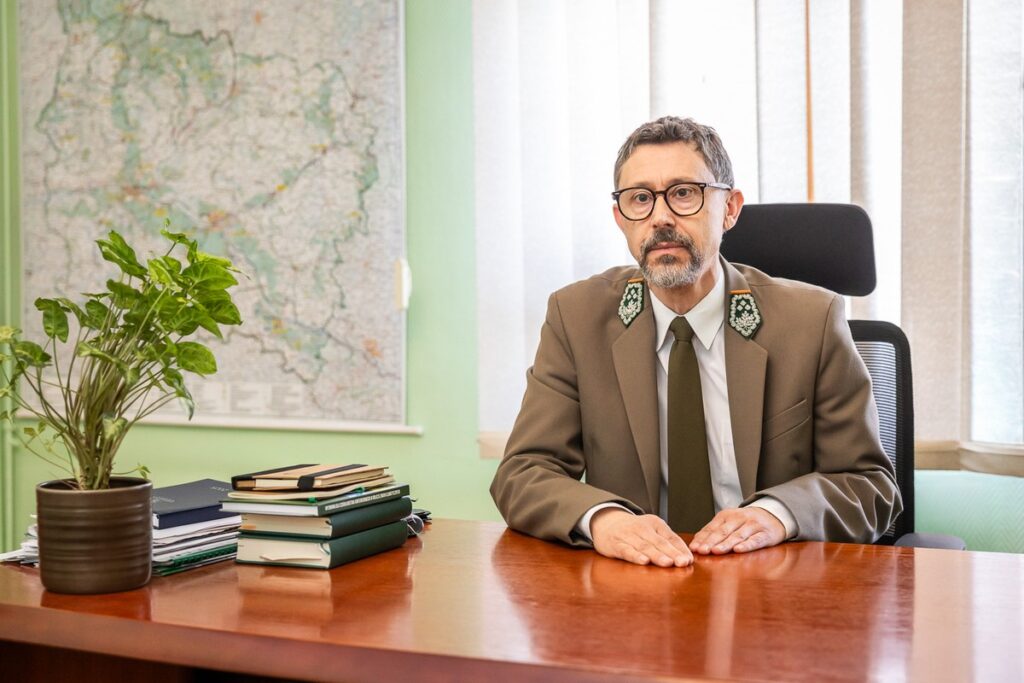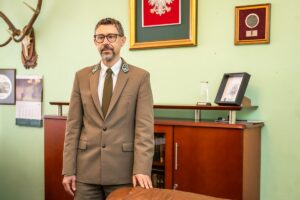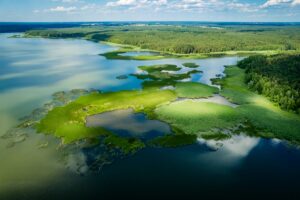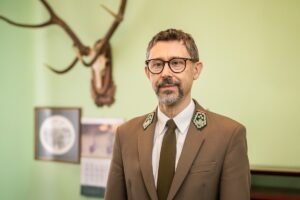
State Forests: nature conservation, management, public expectations
Interview with Włodzimierz Pamfil, Director of the Regional Directorate of State Forests in Toruń
Are the State Forests nowadays mainly about so-called forest management, i.e. exploitation, or rather nature protection?
The State Forests follow a model of sustainable forest management, in which three pillars are treated equally: production, protection and social. Although timber harvesting remains an important element of our activities, we cannot speak of exploitation in the traditional sense of the word. We prioritise the sustainability and multifunctionality of forests, which means that we manage them in a way that ensures their regeneration and the protection of valuable ecosystems. This year alone, we will plant nearly 3 600 hectares of new forests. The moment of planting is always an opportunity for us to make the new generation of trees more resilient to ongoing climate change.
The turn towards more comprehensive nature conservation has intensified in recent decades, particularly in response to Poland’s growing environmental awareness and international commitments to biodiversity conservation and climate change adaptation. In practice, this has meant, among other things, increasing the area of protective forests, developing a network of reserves, applying ecosystem-based methods of silviculture and intensifying cooperation with scientists and environmental organisations. We also take care of the most valuable elements of the region’s nature – recently, we have given special care to old-growth forests, designating 56,000 hectares of so-called ‘environmentally valuable areas’. Recently, 16 new nature reserves were established on our initiative in the areas under our Regional Directorate.
For years, we have been pioneers in the implementation of modern technologies. We have purchased a photogrammetric reservoir integrated with a manned aircraft to produce high-resolution orthophotos, which help us gather a lot of important information about the condition of forests. Analysing and processing them allows us to quickly take the right steps and decisions to protect the forest and its stability. We have also developed a so-called differential plant health index based on satellite imagery (…), thanks to which we are able to collect material on the health of trees in a very short time, when disease symptoms are not yet visible to the naked eye.
Recently, we have also been carrying out wildlife inventories using unmanned surface vessels – saving time and effort for people and stress for the animals.
It is fair to say that there is an increasing focus on protecting nature and managing it wisely.

Fot. Szymon Zdziebło/tarantoga dla UMWKP
How did you celebrate the recent Forest Day (21 March)? What do we achieve socially by putting such dates on the calendar?
International Day of Forests is an excellent opportunity to promote the importance of forests and nature education. This year, the Regional Directorate of State Forests in Toruń has organised a number of events, including tree planting campaigns, educational workshops for children and young people and open meetings with foresters (…).
I believe that such events are of great social importance – they raise environmental awareness, involve residents in environmental activities and strengthen social ties. The celebration of Forest Day is also an opportunity to emphasise the role of sustainable management of natural resources – so that they can serve future generations. On a daily basis, we consolidate the social dialogue that was initiated last year with, among other things, a debate on forests around the Bydgoszcz-Toruń agglomeration and their important social function.
We are aware of the importance that forests have for human beings, but we welcome all voices on the subject with openness. We are pleased that discussions on this topic are attracting increasing interest.

Las nad Zalewem Koronowskim, fot. Tomasz Czachorowski/eventphoto dla UMWKP
The State Forests are 100 years old, one of the slogans of last year’s celebrations was ‘100 reserves for the 100th anniversary’. Which ones have been created in our region?
As I have already mentioned, 16 new nature reserves have been created in the area of the Regional Directorate of State Forests in Toruń, which perform a variety of conservation functions. Peatlands play a fundamental role in regulating water management, but they also store carbon dioxide. Keeping them properly hydrated ensures that this greenhouse gas continues to remain in peat deposits. Rare peatland plants, including many endangered species, are also protected in our reserves. Examples of such reserves are the Jezierzba Peat Bog in the Woziwoda Forest District and the Okoniny Peat Bog in the Tuchola Forest District. Forest and lake reserves, on the other hand, guarantee the survival of ecosystems that are valuable in terms of nature, with often unique species composition. Such reserves have been created, among others, in the Zamrzenica and Rytel Forest Districts.
Reserves are an important element of nature education and the natural heritage protection system, also contributing to a better understanding of the processes occurring in natural ecosystems. Establishing new ones is also a symbolic gesture that reminds us of our responsibility for the state of the environment and the preservation of biodiversity. (…)

Fot. Szymon Zdziebło/tarantoga dla UMWKP
You are a forester with impressive seniority, but a director in the National Forests new to the job. How would you describe your current mission?
I see it as a task that requires balancing the interests of nature conservation, forest management and public expectations. My priority is to strengthen the position of the State Forests as a modern, transparent institution that manages forest resources responsibly, cares about the environment and environmental education.
I want to develop cooperation with scientists, environmental organisations and local communities to make joint decisions on the future of forests. I want our region’s forests to be a model of good practice.
28 March 2025.


